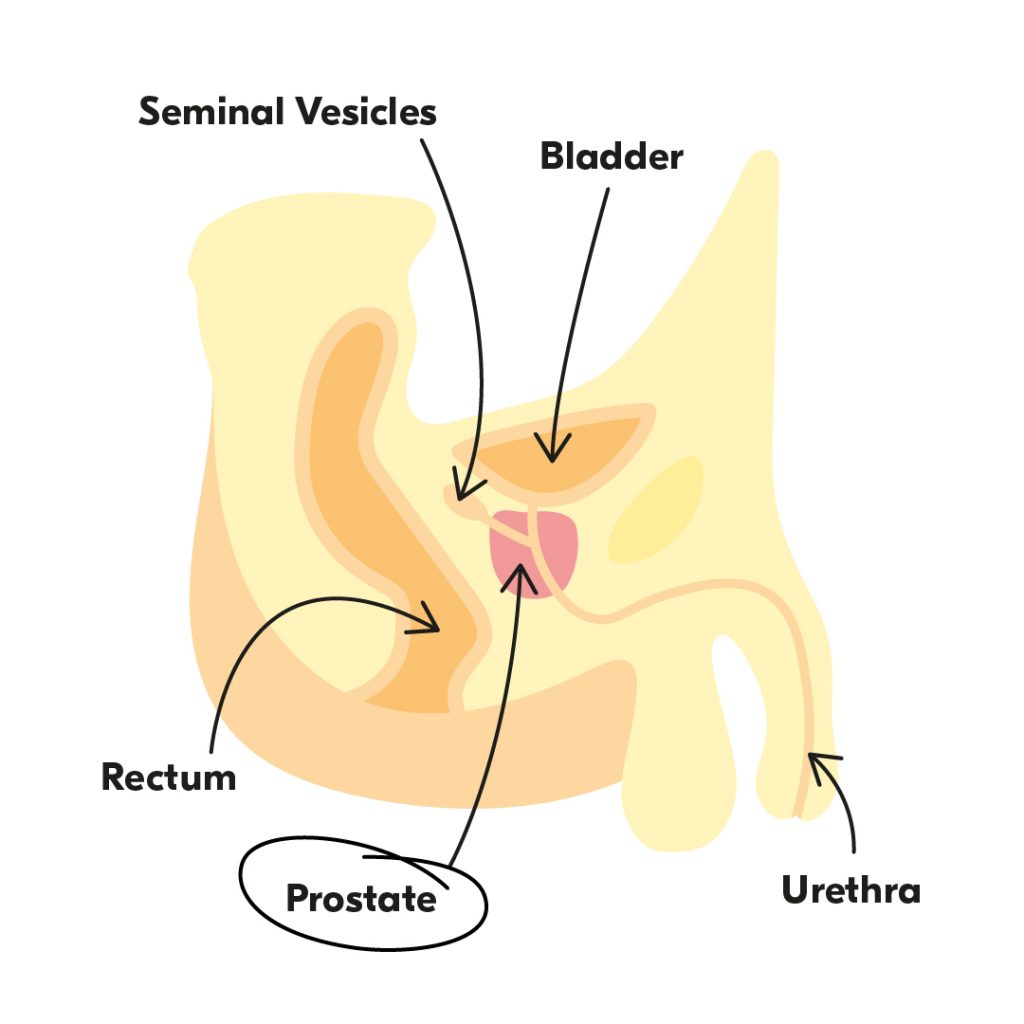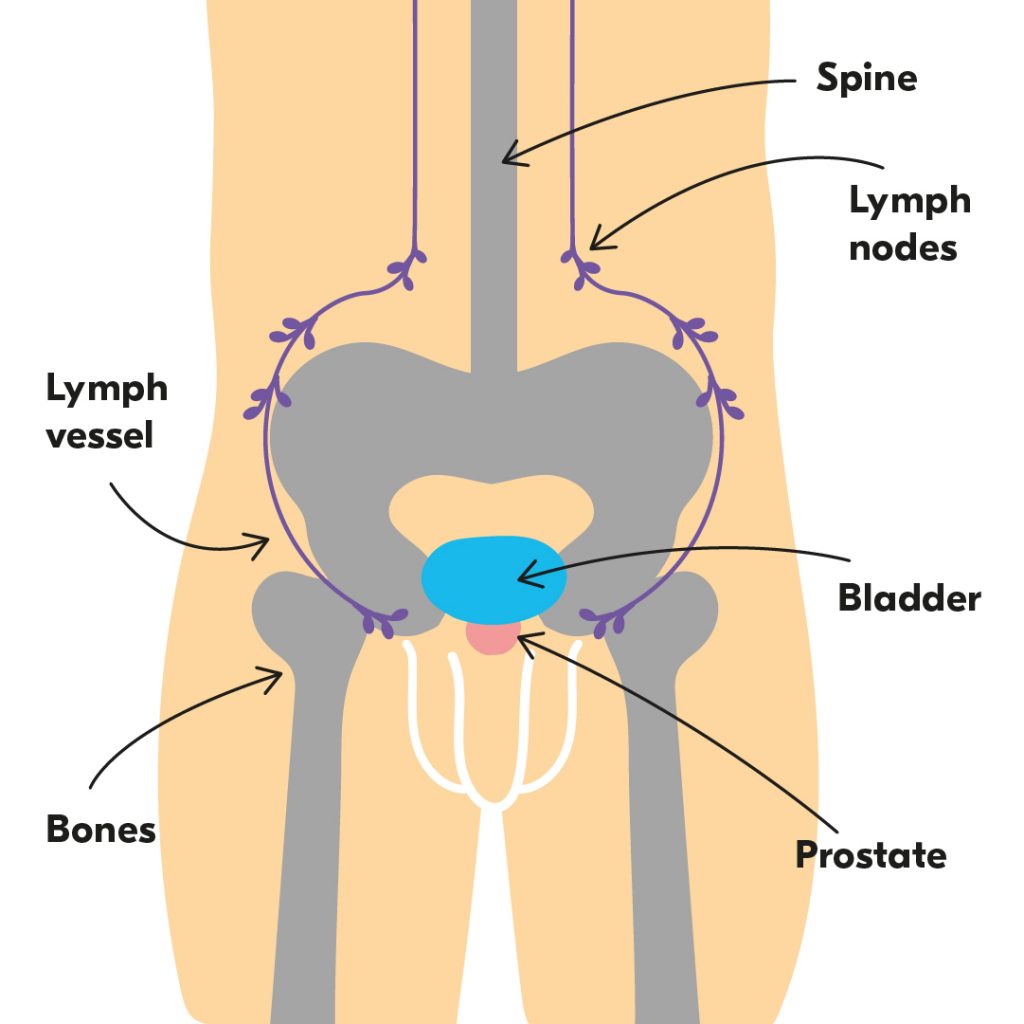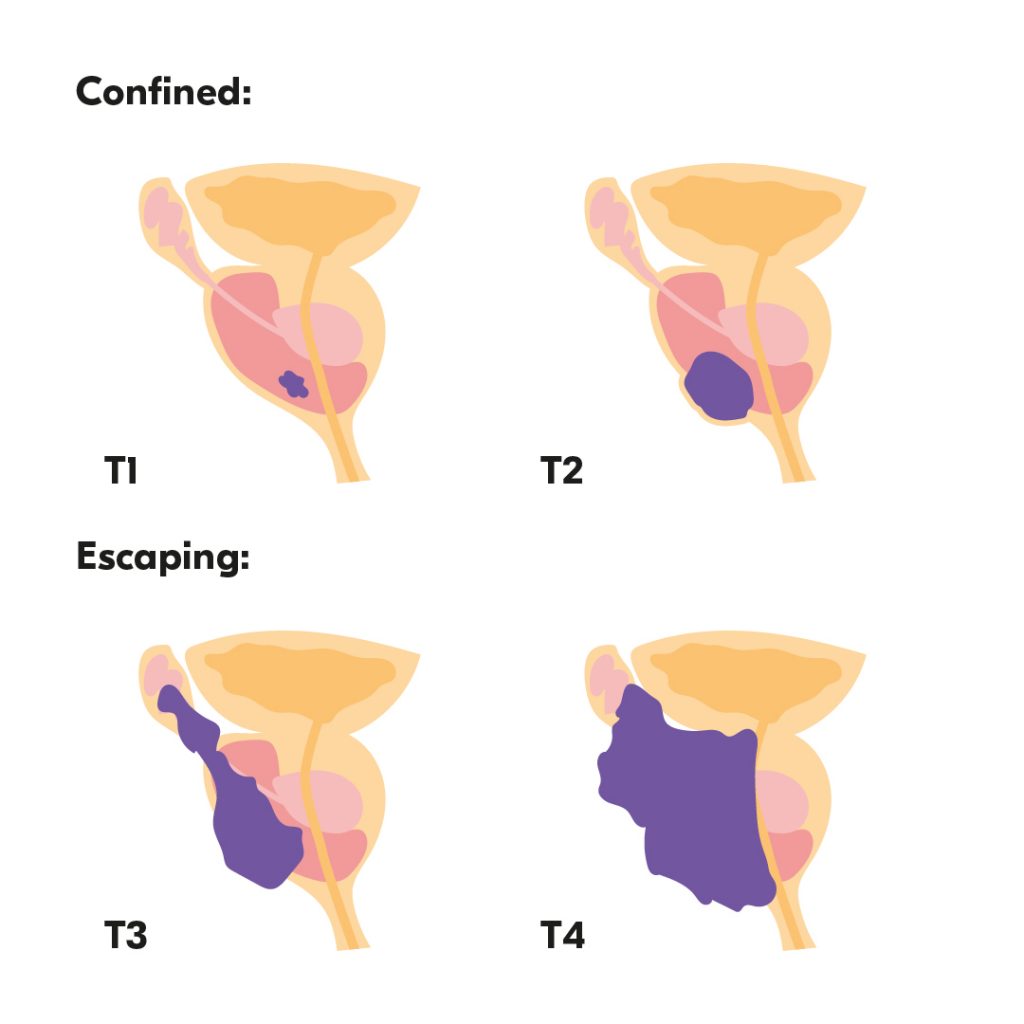Prostate Cancer is a difficult disease, and the choices facing a man who is diagnosed are complex – perhaps more complex than any other major cancer
The prostate is a gland that sits underneath the bladder and surrounds the urethra, which is the tube that carries urine (wee) out of the body. Its main job is to help create semen, the fluid that carries sperm.
It is normally the size and shape of a walnut grows bigger as you get older. Having an enlarged prostate can be one of the most common prostate problems seen in men over 50, however for most men it is not cancerous. The most common prostate problems are an enlarged prostate, prostatitis and prostate cancer. If you have any concerns regarding your prostate, you should contact your GP or other Healthcare professional for advice.

Men, Trans Women*, non-binary people who were assigned male at birth**, some intersex people*** have a prostate.
* A trans woman is someone who was assigned male at birth but identifies as a woman. Trans women can develop prostate problems, even if they have taken hormones. The prostate is not removed during genital reconstructive surgery.
** A non-binary person may not identify as a man or a woman.
*** An intersex person may have both male and female sexual characteristics and so might have a prostate.
The information we have gathered has been developed based on guidance and evidence in men. If you are a trans woman, male-assigned non-binary or intersex, some of this information is still relevant to you – but your experience may be slightly different.
Prostate Cancer is the most common cancer in men in the UK, where 1 in 8 men and 1 in 4 Black Caribbean and Black African men will be diagnosed in their lifetime*. It often develops slowly, meaning many men will not show any signs for a number of years and therefore never needing treatment.
However, sometimes Prostate Cancer can develop rapidly. This is where the cells in the prostate start to grow in an uncontrollable way and is more likely to spread. When this occurs, treatment is often needed to stop the cancer from spreading.
If the prostate cancer grows near your urethra (the tube you pee through) and presses against it then this can change the way you pee. It’s a bit like stepping on a hosepipe in the garden! However, if the cancer is in the outer part of the prostate then urinary symptoms are much less likely to occur.
If you start to notice any of the following changes, we recommend it is still best to seek medical advice:
These symptoms can be produced both by a normally enlarging non-cancerous prostate (benign prostatic hypertrophy, BPH) or by a cancer. The majority of people with these symptoms will not have prostate cancer.
We do recommend getting checked regularly with a PSA test (link to PSA page), as early Prostate Cancer may not produce symptoms.
Localised prostate cancer is cancer that is completely inside the prostate gland, which hasn’t spread outside of the prostate gland or to any other parts of the body.
Doctors can also describe the prostate cancer using the grade and TNM stage.
Locally Advanced Prostate Cancer, is where the cancer has significantly broken through the covering of the prostate gland. Sometimes this is called T3 or T4 prostate cancer. Areas where the cancer could have spread to are:
Sometimes the term ‘Locally Advanced Prostate Cancer’ can be used in different ways, so it’s always good to ask your doctor or nurse to clarify exactly what they mean.
Advanced Prostate Cancer, is where the cancer has spread from the prostate into other parts of the body (known as metastases). This develops when the prostate cancer cells travel through your blood stream or the lymphatic system.
Prostate cancer can spread to any part of the body however it commonly spreads into the bones and lymph nodes, which are part of the lymphatic system. Lymph nodes are found in multiple areas in the body, including the pelvic area, which is near the prostate.

Advanced Prostate Cancer can cause symptoms these can differ depending on where the cancer has spread to and how severe it is. It is important to speak with your doctor or nurse if you show symptoms. They will advise on the treatments available which will help manage you them.
It is not possible to cure advanced prostate cancer, however there are treatments which can reduce the size of the metastases, reduce symptoms, improve quality of life and prolong life.
The Grading and spread of cancer can be determined by the severity of the disease.
The grade of prostate cancer tells you how much the cancer cells look like normal cells. The Gleason score is the most common system used to grade prostate cancer.
The stage of a cancer tells you how big it is and how far it has spread. It helps your doctor decide which treatment you need. Doctors use a staging system called TNM (Tumour, Node, Metastasis). More info can be found here.
Although we don’t know what exactly causes prostate cancer, there are certain aspects that could influence the chances of diagnosis. These are:

Localised or early prostate cancer may not produce any symptoms. Being aware of the risks and knowing when to be appropriately tested are important.
Learn more about the process of diagnosis and what it means for you and your loved ones


Learning to live with with the effects of Prostate Cancer doesn’t have to be difficult with our help and advice

We’ve curated a collection of resources to help you learn more about Prostate Cancer and what you can expect through the process from diagnosis to treatment and beyond.
Whether you like to explore medieval castles, take long bike rides, or just listen with a cuppa and a biscuit, we have over 90 support groups around the country, to help tackle prostate cancer in ways that are best for you
Whether you want to host a community coffee morning or run a local 10k. There are many ways you can help support us on our mission to tackle prostate cancer. For more information on how you can get involved please click below.
Have another query? A member of our team are always here to help you and your loved ones with any questions you have regarding your prostate cancer.
Whether you’re living with prostate cancer, are connected with someone who has prostate cancer, or are community member running a Tackle support group. Sign-up to our monthly newsletter for content that’s tailored to you.
124 City Road,
London,
EC1V 2NX
Tackle Prostate Cancer is the campaign name of The National Federation of Prostate Cancer Support Groups, Registered Charity No 1163152.
A Company Limited by Guarantee. Registered in England No: 9672970
With your help we can help make a difference to the lives of thousands of men and their loved ones.
© Tackle Prostate Cancer 2022
Website by Out of Place Studio